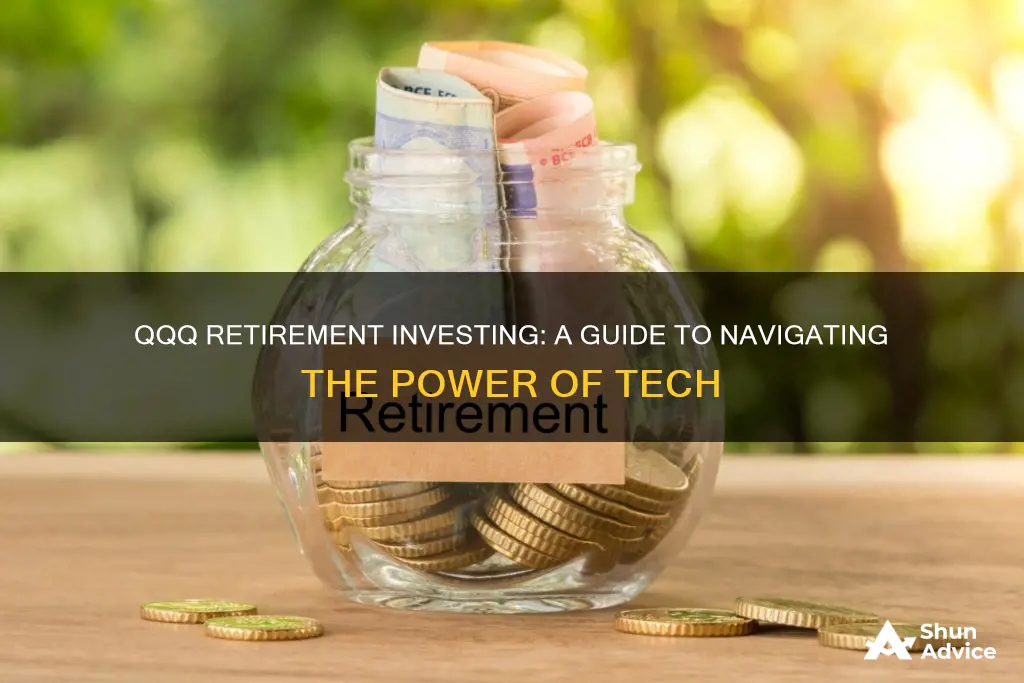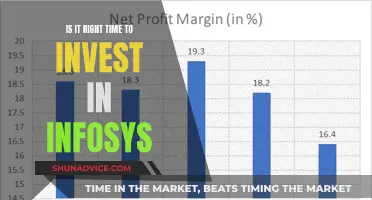
QQQ investment is an exchange-traded fund (ETF) that tracks the performance of the NASDAQ-100 index, which includes top-performing technology companies like Apple, Amazon, Google, and Facebook. Investing in QQQ offers benefits such as portfolio diversification, exposure to leading tech companies, and lower fees compared to mutual funds. However, it carries risks like concentration and market risk, and it's essential to consider these before investing. With its high volatility and growth potential, QQQ is suitable for investors seeking tech-oriented portfolios.
| Characteristics | Values |
|---|---|
| Type of Investment | Exchange-Traded Fund (ETF) |
| Performance Tracked | NASDAQ-100 Index |
| Top Holdings | Apple, Microsoft, Amazon, Nvidia, Meta Platforms, Broadcom, Alphabet Class A, Alphabet Class C, Tesla, Adobe |
| Average Annual Return | 18.59% over the past 10 years |
| Expense Ratio | 0.20% |
| Management Fees | Low |
| Liquidity | High |
| Risk | Concentration risk, market risk, volatility risk |
What You'll Learn
- QQQ investment benefits: diversification, exposure to top-performing companies, lower fees
- QQQ investment risks: concentration risk, market risk, volatility
- QQQ investment process: choosing a brokerage firm, setting up an account, placing an order
- QQQ vs Nasdaq: QQQ is an ETF that tracks the performance of the Nasdaq-100 Index
- QQQ stock holdings: top holdings include Apple, Microsoft, Amazon, Nvidia, Meta

QQQ investment benefits: diversification, exposure to top-performing companies, lower fees
The Invesco QQQ ETF is an exchange-traded fund (ETF) that tracks the Nasdaq-100 Index, which is comprised of the 100 largest non-financial companies listed on the Nasdaq exchange. This includes some of the world's most innovative tech companies, such as Apple, Amazon, Google, and Meta.
Diversification
QQQ offers investors broad exposure to a specific asset class or market sector, helping to manage overall investment risk. In particular, QQQ is heavily weighted towards large-cap technology companies, but it also has exposure to other sectors, including consumer discretionary, communications services, and healthcare.
Exposure to Top-Performing Companies
QQQ provides investors with access to some of the world's top-performing companies, including leaders in software, hardware, e-commerce, social media, and biotechnology. These companies have demonstrated a long track record of innovation and have a history of outperforming the market.
Lower Fees
The QQQ ETF is passively managed, which helps to keep fees low for investors. The expense ratio for QQQ was 0.2% as of Q2 2024, and the average ETF tends to cost less than comparable mutual funds. In 2021, the average ETF cost less than half of the cost of a comparable mutual fund.
Large Loans or Investments: Where Should Your Money Go?
You may want to see also

QQQ investment risks: concentration risk, market risk, volatility
QQQ investment is an exchange-traded fund (ETF) that tracks the performance of the NASDAQ-100 index, providing investors with exposure to top-performing technology companies in the US stock market. While investing in QQQ has its benefits, there are also associated risks, including concentration risk, market risk, and volatility.
Concentration Risk
The QQQ ETF has a heavy concentration in the technology sector, with over 50% of its holdings in FAANGM stocks (Facebook, Amazon, Apple, Netflix, Google parent Alphabet, and Microsoft). This concentration risk means that if any of these large-cap tech stocks experience a significant fall in value due to unforeseen events like regulatory issues or new market competition, it could lead to substantial losses for investors who have invested heavily in QQQ. To mitigate concentration risk, investors should consider diversifying their portfolios by investing in different sectors and securities.
Market Risk
Market risk refers to the potential losses that can occur when the stock market experiences unexpected fluctuations or downturns. The QQQ's close alignment with the NASDAQ-100 index means that it tends to be sensitive to market movements, and its performance may be impacted by broader economic trends and industry news. A crucial factor influencing market risk is inflation. If the inflation rate increases disproportionately to returns from QQQ investments, investors' purchasing power and investment gains could decrease significantly over time.
Volatility
Tech sector stocks, including those in the QQQ ETF, are growth stocks known for their volatility. As a result, the NASDAQ-100 index and the QQQ share price tend to make more significant daily, monthly, and annual moves than other indexes, such as the S&P 500. For example, the fund had annual returns of -0.12% in 2018, 38.96% in 2019, -32.58% in 2022, and 54.85% in 2023. This volatility can cut both ways, offering the potential for high returns but also the risk of significant losses.
Planning for Retirement: A Step-by-Step Guide to Investing
You may want to see also

QQQ investment process: choosing a brokerage firm, setting up an account, placing an order
To begin investing in QQQ, you must first select a brokerage firm. When choosing a brokerage firm, consider factors such as commission fees, user interface, research tools, customer support, and security. Some brokers may even offer services specifically tailored to QQQ traders, such as commission-free trades on ETFs or lower minimum investment thresholds. It is important to conduct thorough research to ensure you are getting the optimal trading opportunities with minimal costs.
Once you have chosen a brokerage firm, the next step is to set up an account. This typically involves filling out an application form, providing verification documents, and submitting your application for approval. After receiving approval, you will need to deposit funds into your new trading account. Most brokerage firms will have specific eligibility requirements that must be met before approving your request, so be sure to review these carefully. Additionally, check for any additional fees associated with purchasing and holding QQQ shares, as these costs may vary depending on the brokerage firm.
After setting up your account, you are now ready to place an order for QQQ shares. To do so, simply indicate the number of shares you wish to purchase and the price you are willing to pay. It is important to note that market fluctuations can cause changes in the value of QQQ, so the prices may differ from the initial offering price. Furthermore, there may be fees associated with trading and holding these shares.
By following these steps and conducting thorough research, investing in QQQ can be a great way to diversify your portfolio and gain exposure to top-performing technology companies.
Investing: Timing the Market
You may want to see also

QQQ vs Nasdaq: QQQ is an ETF that tracks the performance of the Nasdaq-100 Index
QQQ, otherwise known as the Invesco QQQ Trust or PowerShares QQQ, is an exchange-traded fund (ETF) that tracks the performance of the Nasdaq-100 Index. This means that the QQQ share price goes up and down along with the Nasdaq-100.
The QQQ ETF is heavily weighted towards large-cap technology companies, including Apple, Microsoft, Amazon, Nvidia, Broadcom, Meta, and Alphabet (Google). It is also rebalanced quarterly and reconstituted annually.
By investing in the QQQ ETF, investors gain exposure to the largest 100 non-financial companies listed on the Nasdaq. This provides a good opportunity for portfolio diversification and exposure to growth-oriented US companies across various sectors, including technology, healthcare, consumer goods, and industrials.
The QQQ ETF has delivered strong long-term performance, outperforming the S&P 500 over the past decade. It has also been praised for its low expense ratios, which result in lower fees compared to mutual funds.
However, it is important to consider the risks associated with investing in the QQQ ETF, such as concentration risk and market risk. The fund is highly concentrated in tech stocks, and its performance is directly tied to the success of these companies. Additionally, the QQQ ETF has a Nasdaq-only focus, excluding successful tech companies listed on other exchanges.
In conclusion, the QQQ ETF is a popular choice for investors seeking exposure to the technology sector and long-term growth. It offers advantages such as diversification, low fees, and exposure to top-performing companies. However, investors should also be aware of the associated risks and consider seeking financial advice before investing.
GME: Invest Now or Never?
You may want to see also

QQQ stock holdings: top holdings include Apple, Microsoft, Amazon, Nvidia, Meta
QQQ is an exchange-traded fund (ETF) that tracks the performance of the NASDAQ-100 Index. As such, its holdings are dominated by big technology-related companies.
The top holdings of the QQQ ETF include some of the biggest names in tech:
- Apple Inc (NASDAQ: AAPL): Apple is a well-known technology company with strong operating cash flows and a loyal customer base. It has consistently delivered on the bottom line and has been able to successfully navigate changes in the market.
- Microsoft Corporation (NASDAQ: MSFT): Microsoft is the top holding of the QQQ ETF, with a market cap of over $3.3 trillion as of Q2 2024. The company has successfully reinvented itself, transitioning to cloud-based services and artificial intelligence while still offering legacy products like operating systems.
- Amazon.com, Inc. (NASDAQ: AMZN): Amazon is another giant in the tech space, classified in the consumer discretionary sector. It has strong operating cash flows and is a favourite among investors and funds.
- Nvidia (NASDAQ: NVDA): Nvidia became one of the top-performing tech stocks in 2024.
- Meta Platforms, Inc. (NASDAQ: META): Formerly known as Facebook, Meta Platforms is now a company under the communications services sector.
These top holdings make up a significant portion of the QQQ ETF's total assets. As of Q2 2024, the top 10 stocks in the portfolio made up about 51% of all QQQ holdings.
Beanie Babies: A Collectible Craze
You may want to see also
Frequently asked questions
A QQQ investment is an exchange-traded fund (ETF) that tracks the performance of the NASDAQ-100 Index, which consists of technology giants like Apple, Amazon, Google, and Facebook.
Investing in QQQ offers benefits such as portfolio diversification, exposure to top-performing technology companies, and lower fees compared to mutual funds.
Investing in QQQ carries risks such as concentration risk and market risk. Concentration risk arises from its heavy focus on the technology sector, while market risk is associated with the volatility of the NASDAQ-100 Index.
To invest in QQQ, you need to open a brokerage account and purchase shares of the QQQ ETF. You can choose a brokerage firm that provides QQQ trading services and offers access to the NASDAQ exchange.
QQQ can be a good long-term investment for investors seeking exposure to high-growth technology companies. However, investors must monitor market conditions and make informed decisions based on their risk tolerance, investment objectives, and financial goals.







